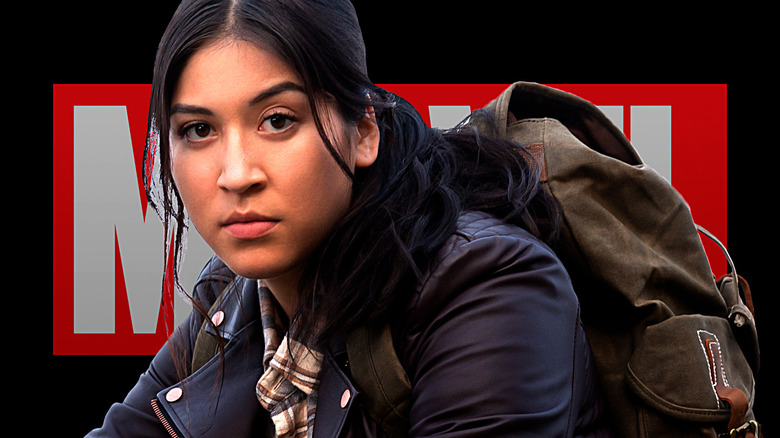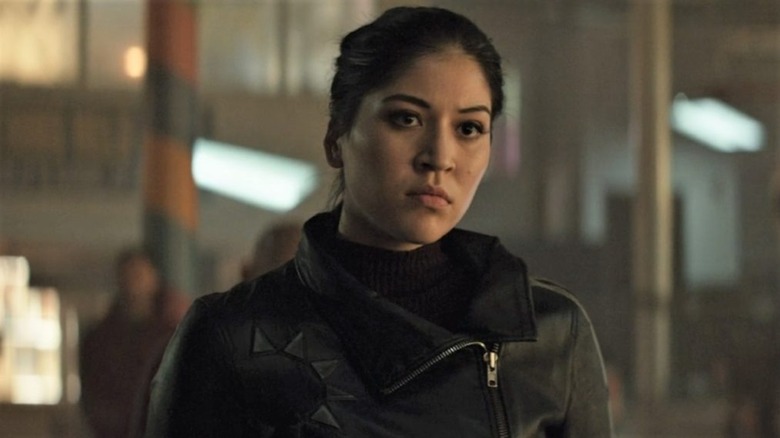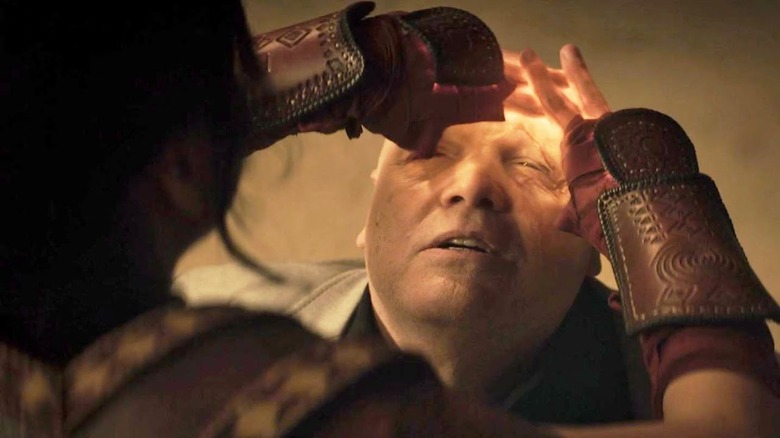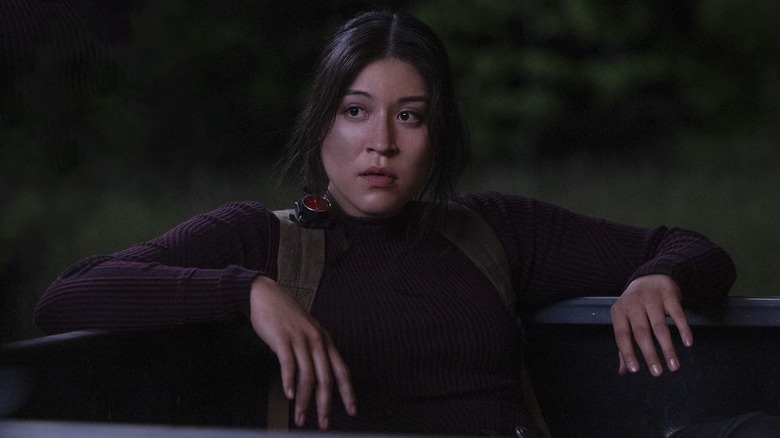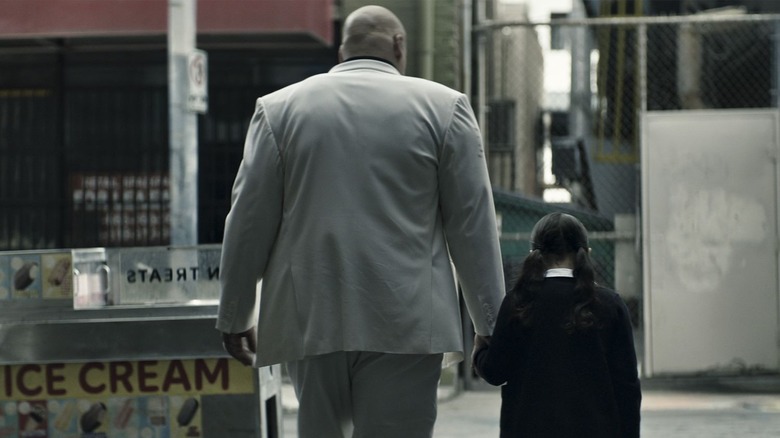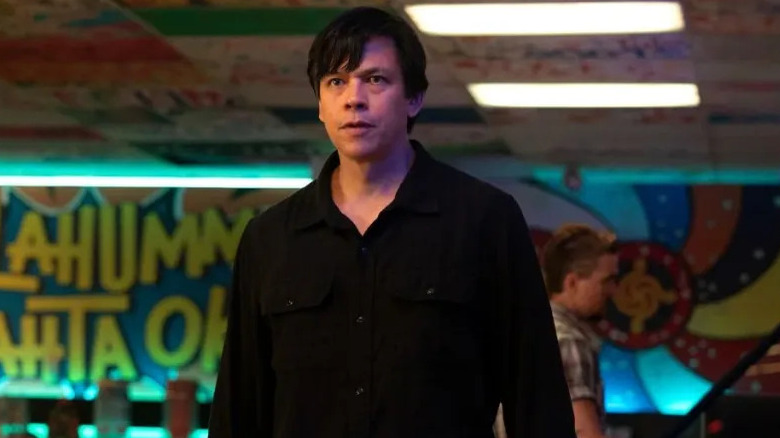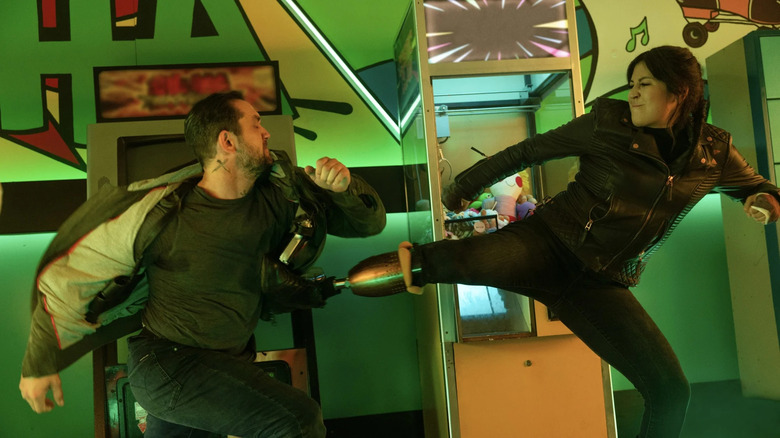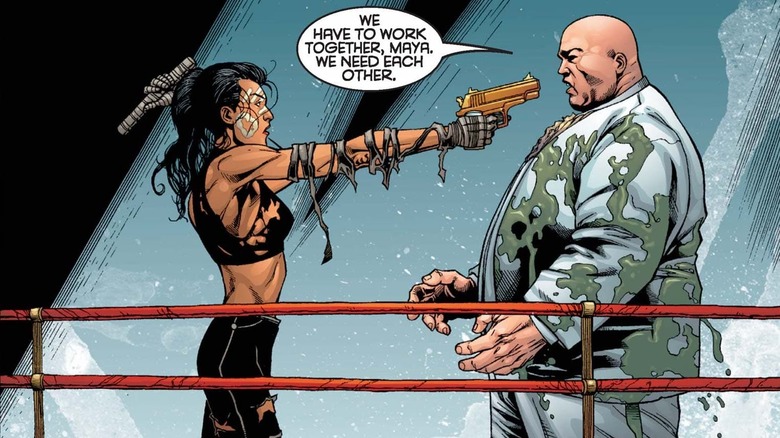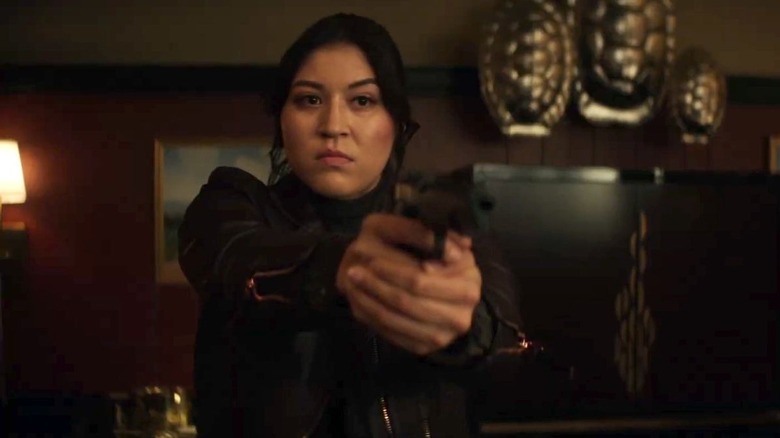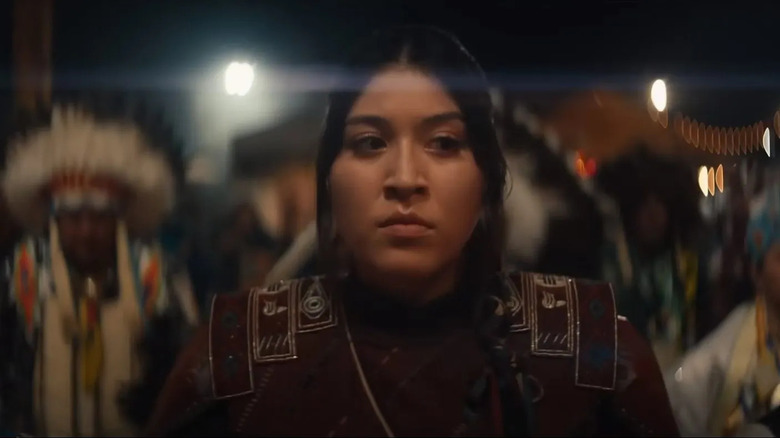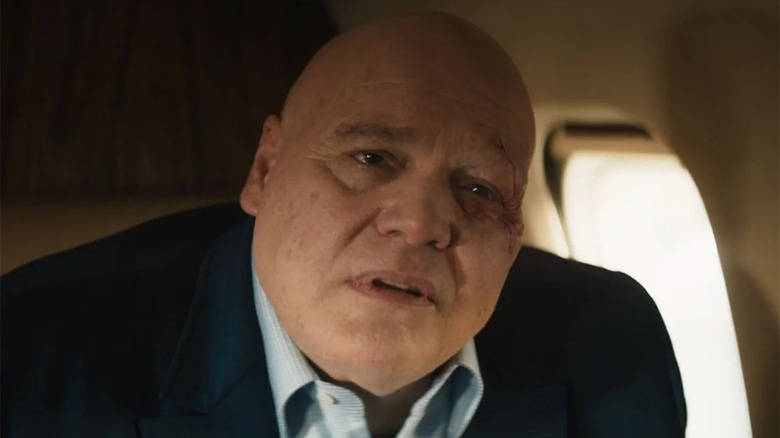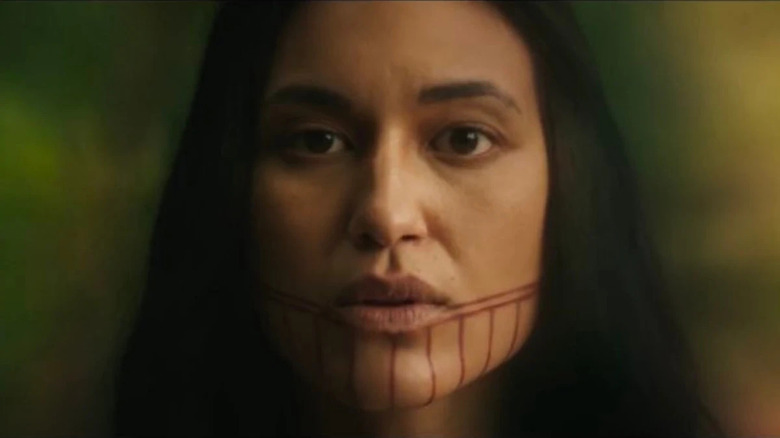The Ending Of Marvel's Echo, Explained
Contains spoilers for "Echo"
The Marvel Cinematic Universe miniseries "Echo" follows Maya Lopez, played by Alaqua Cox. The character was introduced in the 2021 Disney+ show "Hawkeye" as a commander of the Tracksuit Mafia who clashes with Clint Barton (Jeremy Renner) and his protégé Kate Bishop (Hailee Steinfeld) while looking for her father's killer. During that series, it's revealed that Maya works for the crime lord Wilson Fisk (Vincent D'Onofrio), aka Kingpin.
"Echo" is one of Marvel's more unique shows in that it's the first to be categorized as TV-MA. Cox is also among Marvel's more unconventional leading ladies, given that she has Native American heritage, is deaf, and is an amputee, which makes "Echo" a huge step forward for representation in Hollywood. As the first MCU project released under the Marvel Spotlight banner (which indicates that prior knowledge of the MCU isn't required), "Echo" is a grounded and intimate character study of Maya Lopez, exploring her origin as a criminal and the discovery of powers far beyond her control.
In the fifth and final episode, Maya faces the consequences of betraying Fisk in "Hawkeye." She finally utilizes the abilities passed down to her by her ancestors to protect her family and scare Kingpin away from her hometown of Tamaha, Oklahoma. Some people feel the show's final moments were a bit of a let-down, but there's more to the finale than meets the eye. We're taking a deep dive into the ending of Marvel's "Echo."
What you need to remember about the plot of Echo (and Hawkeye)
"Echo" takes place directly after the events of "Hawkeye," in which Maya Lopez learns from Clint Barton that, as Ronin, he was anonymously hired by Kingpin to assassinate her father and several other members of the Tracksuit Mafia. Maya subsequently leaves Kingpin's organization and confronts her former friend Kazi Kazimierczak (Fra Fee), killing him during the Tracksuit Mafia's battle against Clint and Kate Bishop. She later ambushes Fisk and shoots him, presumably putting an end to New York City's greatest gangster.
This is where "Echo" picks up, with Maya returning to her hometown of Tamaha, Oklahoma to take over Fisk's operations there. She locks horns with her uncle Henry (Chaske Spencer), who, like Maya's father, was involved with Kingpin's organization against his will. After attracting unwanted attention from the Kingpin's henchmen, Maya discovers that Fisk is alive, and he offers her a chance to return to New York and resume operations as his "Queenpin."
Throughout all of this, Maya is also battling recurring visions of her ancestors, including the first Choctaw woman, Chafa, as well as Tuklo, a Choctaw warrior from the 1800s. She's also confronting her strained relationships with her family members, including her cousin Bonnie (Devery Jacobs), whom she avoided contact with following her father's death, and her grandmother Chula (Tantoo Cardinal), whose anger towards Maya's father left them estranged.
What happens at the end of Echo?
Before the fifth episode of "Echo," Maya learns the truth about her visions from Chula, realizing that her ancestors are contacting her during critical moments. Later, she confronts Kingpin in his hotel room and nearly accepts his offer to kill him, calling back to his own experience of killing his father to free himself from an abusive household. However, she refuses.
Most of episode 5 centers on Tamaha's Choctaw Nation Powwow, a festival celebrating their ancestry. The Tracksuit Mafia arrive in search of Maya, forcing Henry and Biscuits (Cody Lightning) to hold them off. Maya, wearing a costume gifted to her by Chula, is cornered by Kingpin and his henchmen, who have Chula and Bonnie held hostage. Kingpin threatens to kill them so that he's the only family Maya has left, but Maya uses her ancestral powers for the first time to not only fight off Fisk's goons, but to empower Chula and Bonnie to fight alongside her.
Finally, Maya takes control of Fisk's mind, sending him back to pivotal moments in his life, including the moment before he decided to kill his father. She encourages him to let go of his pain. Fisk, terrified of Maya's powers (and perhaps of his own memories), abandons his plan and escapes with his remaining henchmen. Before Maya leaves Tamaha, she visits her family at a barbecue and is warmly welcomed by Chula and the others, all of them free from Kingpin's control.
Echo follows Maya's journey from villain to hero
An important aspect of "Echo" involves Maya completing her transformation from villain to superhero. Previously, characters like Wanda Maximoff and Loki have slowly become heroes that audiences root for throughout their time on-screen, putting Maya in good company among the Marvel Cinematic Universe's roster of evil-doers-turned-good-guys.
When Maya is first introduced in "Hawkeye," she's relentlessly chasing down Ronin for killing her father, targeting Kate Bishop and later Clint Barton. However, audiences can still empathize with Maya during this villain arc, especially after flashback sequences show her father encouraging Maya to adapt to a world that won't accept her. However, when Fisk turns up alive in "Echo," Maya must choose between her family and her ambition. It begs the question: Why does Maya choose to be a hero rather than stay on course to become a "Queenpin," like Fisk is offering her?
The answers lie in the flashback sequences depicting Maya's history working for Kingpin, where she misinterprets his affection for her as paternal when it is strategic. Fisk is no stranger to using cruel, manipulative tactics against those close to him, as evidenced in episode 4 of "Echo" when he brings Maya her favorite cookies to entice her into listening to him. The only difference is, this time around, Maya is much wiser than to trust Fisk's motivations. After all, she didn't pour out an expensive bottle of wine for no reason.
Maya's history with Kingpin is revealed
"Hawkeye" only briefly examines Maya's history with Wilson Fisk, revealing that Maya's father, William, was Fisk's partner in operating the Tracksuit Mafia. As a result, Fisk took on the role of an uncle figure in Maya's life, which is fleshed out even further through flashback sequences in "Echo." In one important flashback from episode 4 of "Echo," Fisk is surprised when a young Maya joins him in assaulting a rude ice cream vendor. This is the start of Maya's transformation into one of Fisk's closest commanders.
This notably establishes that Kingpin saw something in Maya early on that made her a valuable asset to his criminal empire. He never had to lure her into his world of corruption, as she was a willing participant. Even the act of Fisk assaulting the vendor proves that his love for Maya is genuine, albeit still as toxic as any of Fisk's other relationships.
No more is this apparent as in Fisk's relationship to American Sign Language (ASL), the only way for him and Maya to communicate. While every other character in "Echo" is fluent in ASL, Fisk is not, which Maya calls him out on in episode 4 as evidence that Fisk doesn't truly care about her. Comic Basics interpreted this as an example of Fisk's shortcomings as a character, writing, "Kingpin was likely incapable of truly bonding with people, and since Maya saw him as some kind of heroic personality when she was little, Kingpin liked it."
Maya's relationship with her family is under repair
Family is a major theme in "Echo," with one of the very first scenes depicting the traumatic car crash that tore her family apart. With the show centering on Maya's return to Tamaha, Oklahoma, tensions run high between her and her relatives. There's her uncle Henry, who is still involved in Fisk's organization, her grandmother Chula who turned her back on Maya and her father years ago, and Bonnie, Maya's closest childhood friend who she's desperate to keep away from the criminal world.
Along the way, Maya is plagued with visions of her ancestors, eventually embracing them and being rewarded with superpowers. In a very subtle way, "Echo" shows that Maya is stronger, both literally and figuratively, when she accepts her family, her past, and her flaws. She tries to pass this on to Kingpin during their final fight, forcing him to relive his most painful memories. When Maya encourages Fisk to let go of his pain, Fisk instead runs away, appearing more like a frightened child than an intimidating crime lord.
The strengths of families have been a part of the Marvel Cinematic Universe throughout its many phases, from the very first "Thor" movie to 2021's "Eternals." While tragedy and trauma might make many people run away from the ones they love the most, "Echo" shows that Maya is her best self when she's fighting to protect them, further exemplified by her ability to transfer her powers to Chula and Bonnie.
Maya's generational powers explained
Although some fans may be eager to see Maya Lopez come into her own as a superhero in "Echo," it takes five episodes for the character to embrace her heroic side. It's not until her conversation with Chula in episode 4 that Maya learns that her powers come from her ancestors calling to her. As Chula phrases it, "Generations are echoing, reaching out to us at a time when we need them the most."
Many fans have felt the explanations for Maya's superhero abilities were underdeveloped, with The Ringer writing, "Lopez's superpowers ... manifest late in the season but are never really explained or demonstrated clearly." There are many different powers showcased among the Lopez women, from her mother's ability to heal others, to Maya's ability to force others to experience visions, as she does with Kingpin.
Ultimately, it appears that Maya's superpowers are gifts given to her by her ancestors, who even visually appear alongside Maya during her final fight with Kingpin. While the exact details of what she can do remain unclear to viewers of "Echo," the important distinction is that Maya is being aided along her journey by the strong Choctaw women who came before her. The main lesson derived from Maya's story is that she is stronger when she embraces the fact that she's living as a result of her family's past, not in spite of it.
How does the MCU's Echo differ from the comic book version?
In "Echo," Maya's superpowers are rooted in Choctaw mythology, with her oldest ancestor Chafa becoming a heroic figure of the Choctaw creation myth. Many aspects of Choctaw mythology play an integral role in shaping the origins of Maya's powers, but this comes as a huge shift for those familiar with the character from Marvel Comics. Maya first appeared in 1999, sent by Kingpin to antagonize Matt Murdock, but the adversaries eventually became romantically entangled.
Maya's connections to Kingpin in the comics are similar to how they're adapted on-screen. However, one massive change with Maya comes with the incorporation of her powers. In the comics, Maya has photographic reflexes, allowing her to copy her opponents' movements. This is, coincidentally, a similar ability to Taskmaster, who appeared as an antagonist in 2021's "Black Widow." It's not the first time Marvel has done this with their characters, making similar changes to Kamala Khan in the 2022 series "Ms. Marvel," where her new abilities were also reinterpreted to fit her cultural background and ancestral history.
The change in powers this time around was explained by the show's director and executive producer, Sydney Freeland, as an attempt to be more representative of Choctaw history. As Freeland admitted to Variety in 2023, "Her power in the comic books [is] kind of lame," also saying that "representation was extremely important to myself and to everyone on the crew."
What has the cast and crew said about the ending?
"Echo" is one of Marvel's more ambitious projects, despite also being its shortest at only five episodes. As the show's star, Alaqua Cox, told Collider, the emotional scenes with Vincent D'Onofrio towards the end were challenging. "I remember looking on the call sheet for the next day and seeing how it was such an intense, emotional scene, and I said, 'Oh, crap.'" However, she also hoped the show left fans wanting more, stating, "We never know where Maya is gonna go next, so I think that they'll all be curious about that."
The supporting actors in "Echo" also felt intimidated by the project. Also speaking to Collider, Devery Jacobs (who plays Bonnie) singled out the finale's Pow-Wow as a daunting set piece, claiming it "was done so beautifully by our director, Sydney Freeland, who is just, like, a rock star in all of it, and I don't think that we could have brought it home with anyone else."
Vincent D'Onofrio also described to Entertainment Weekly how the final scene of Kingpin sets up a promising future for his character, stating, "There are so many places to go with this character, it's crazy." D'Onofrio also feels optimistic about his return in "Daredevil: Born Again," stating that "the reception of 'Echo' so far is helping everybody understand that this is a really good tone for 'Daredevil' too. I think 'Born Again' is heading in that direction in a major way now."
What could the ending of Echo mean for the MCU?
There are plenty of other firsts with "Echo" as Marvel's latest series, one of which being its designation as "Marvel Spotlight." Back in November 2023, this was described as Marvel Studios' attempt to signify to audiences which shows and movies would be integral to the overall narrative of the MCU going forward. Because "Echo" is the first to be labeled as such, its success will likely determine Marvel's ambition in moving forward with future "Marvel Spotlight" projects.
The show's success, unfortunately, may also determine Maya Lopez's future in the Marvel Cinematic Universe at large. Noticeably, "Echo" does not end with confirmation that Maya Lopez will return, unlike other Marvel series, and considering the character's current irrelevance to the larger Multiverse Saga of Phases 4 through 6, she may remain a supporting cast member in future projects. One of those may be "Daredevil: Born Again," in which Charlie Cox and Vincent D'Onofrio will be appearing.
There's certainly a lot of stories to be told involving Maya Lopez, if her comic book history is any indication. At one point, the character dons the mantle of Ronin, and at another time, she becomes a host for the Phoenix Force. Maya was also nearly included in the "Moon Knight" series as a potential love interest for Oscar Isaac's Marc Spector, so those two characters could cross paths at some point.
Echo's post-credits scene hints at the future of street-level MCU
Of course, it wouldn't be a Marvel Cinematic Universe installment without a hint as to what's coming up in Marvel's slate of projects. In a mid-credits scene for the final episode of "Echo," Vincent D'Onofrio's Kingpin sits on his private jet waiting to take off and return to New York. His attention is caught by a news program on the plane TV, in which New York City's mayoral election is being discussed.
As Fisk leans in, he hears the news anchors alleging that there are no standout candidates in the current NYC mayoral race, with citizens wanting someone tough who is outside the norms of conventional politics. The look on Fisk's face seems to indicate that he will join the campaign, and knowing how powerful he is in New York City, he'll likely win. This could set the stage for Fisk's role in "Daredevil: Born Again." Despite reports of creative overhauls in recent months, D'Onofrio confirmed on Twitter the changes are all positive, saying, "Frankly I'd be worried if we were settling for less," (via Variety).
This would make "Daredevil: Born Again" an adaptation of an integral Kingpin storyline from Marvel Comics, in which Wilson Fisk becomes the mayor of New York City and furthers his plans to resurrect his dead wife, Vanessa. Fisk's new position could also find him at odds with other NYC-based superheroes, such as Spider-Man, Doctor Strange, and Kate Bishop (yet again).
Echo is Marvel's first (but hopefully not last) collaboration with Native Americans
"Echo" is certainly one of the more exciting projects in the Marvel Cinematic Universe's recent output, whether it's the focus on a deaf, disabled, Indigenous character, or its depiction of violence more akin to the beloved Netflix shows. "Echo" also marks an important step forward for Marvel Studios in terms of progress, as the Choctaw nation was heavily involved in the show's development.
As director Sydney Freeland described to Deadline, "The Choctaws were so crucial ... because they had their own written histories or oral histories and cultures and traditions that were drawn from, and it really was a collaboration between myself, our production and the Choctaws," which did not go unappreciated by Marvel. Right before the credits roll on "Echo," a title card specifically thanks the Choctaw Nation of Oklahoma for their consultations on the project.
The collaboration didn't stop at the development stage, either. Marvel has included a Choctaw language dub of "Echo" on streaming services, while the Choctaw Nation themselves went into detail regarding their work with Marvel on their website. Hopefully, this consideration makes it possible for more Native American Marvel characters to appear on-screen soon, possibly including Wyatt Wingfoot or Warpath.
